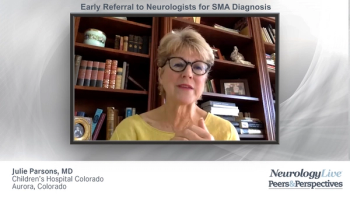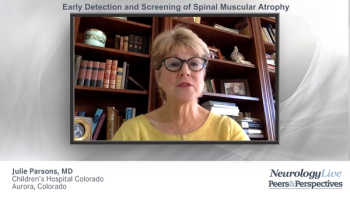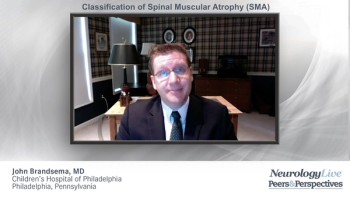
Julie Parsons, MD
Professor of clinical pediatrics and neurology; Haberfeld Family Endowed Chair in Pediatric Neuromuscular Disorders, Children’s Hospital Colorado
Articles by Julie Parsons, MD


Medical professionals explore the challenges and considerations associated with patients with spinal muscular atrophy (SMA) transitioning to independent living, emphasizing the importance of maintaining continuity of care and addressing potential adherence issues to ensure optimal disease management.

Panelists examine the available real-world data (RWD) on the use of risdiplam in adult patients with spinal muscular atrophy (SMA) from various studies conducted worldwide, discussing its potential efficacy and safety as a treatment option for adult SMA patients.

Key opinion leaders address the scarcity of randomized controlled trial data for SMA treatments in adult populations, highlighting the availability of real-world data from numerous studies and provide guidance on how to incorporate this information when making treatment decisions for adult patients with spinal muscular atrophy.

Panelists delve into strategies for engaging in conversations with patients about defining and identifying successful therapy outcomes, providing guidance on how to effectively communicate and establish realistic expectations for treatment success in the context of spinal muscular atrophy (SMA).

Panelists share their approaches to counseling adult patients with spinal muscular atrophy (SMA) about treatment expectations.

Key opinion leaders share their strategies for discussing potential changes in therapy and transitioning between treatments with patients, emphasizing the importance of reassuring patients that such changes are intended to provide long-term benefits for managing their spinal muscular atrophy.

Panelists explore critical considerations when choosing a treatment approach for treatment-naïve adult patients with spinal muscular atrophy (SMA), taking into account factors such as disease severity, patient preferences, and potential treatment outcomes.

Key opinion leaders (KOLs) examine the mechanisms of action and other pertinent information regarding FDA-approved treatments for spinal muscular atrophy (SMA), sharing their perspectives on these therapies with a particular focus on the various modes of administration.

Clinical experts in spinal muscular atrophy (SMA) address the issue of patient disengagement from healthcare services, which can occur due to a perceived lack of disease progression or stabilization, leading to undetected disease advancement and increased risk to patients, and provide recommendations for encouraging patients to re-engage with medical care.

Key opinion leaders (KOLs) further explore the transition of care from pediatric to adult healthcare systems for patients with spinal muscular atrophy (SMA), emphasizing the essential role of multidisciplinary support in ensuring a successful transition.

Key opinion leaders (KOLs) address the challenges and obstacles associated with transitioning patients from pediatric to adult care as they age out of the pediatric system, offering valuable insights and strategies for successfully navigating this process.

Leading medical professionals specializing in spinal muscular atrophy (SMA) discuss the common clinical presentations of undiagnosed or newly diagnosed adult patients, highlighting crucial signs and symptoms that healthcare providers should recognize.

Panelists examine the natural history of spinal muscular atrophy (SMA), assessing the characteristic indicators of motor function deterioration and the loss of ambulatory abilities as patients advance in age.

Key opinion leaders offer a concise summary of the clinical characteristics and classifications of spinal muscular atrophy (SMA), emphasizing the distinctive features observed in adult patients with SMA.

John Brandsema, MD, and Julie Parsons, MD, review the evolution of combination therapy in clinical practice for the management of SMA.

John Brandsema, MD, comments on the importance of patient compliance to therapy to manage spinal muscular atrophy.

Experts in pediatric neurology share insights on the role of small molecule treatment for SMA through the recent FDA approval of risdiplam and discuss factors to consider when tailoring therapy for individual patients.

John Brandsema, MD, leads the discussion on the concept of gene transfer for the management of SMA and the recent approval of onasemnogene abeparvovec-xioi.

Experts in pediatric neurology provide insight on the efficacy of nusinersen and treatment response in patients with SMA.

John Brandsema, MD, and Julie Parsons, MD, discuss the approval of nusinersen for the treatment of spinal muscular atrophy and their personal experiences regarding drug safety and administration in patients.

Expert pediatric neurologists review the importance of early recognition and referral to neurologists for the diagnosis of spinal muscular atrophy and when it’s appropriate to approach treatment.

Julie Parsons, MD, comments on the role of primary care providers and gene testing for the early diagnosis of spinal muscular atrophy.

Identifying spinal muscular atrophy through early diagnosis using prenatal and newborn screenings is discussed.

Julie Parsons, MD, discusses the importance of a multidisciplinary team approach to managing SMA in clinical practice.

John Brandsema, MD, leads the discussion on the 5 main types of spinal muscular atrophy and the evolution of disease classification.

The Endowed Chair in Pediatric Neuromuscular Disorders and professor of clinical pediatrics and neurology, at Children’s Hospital Colorado discussed the future of SMA treatment.

The primary investigator of the phase 4 RESPOND study discussed the role that postmarketing studies can play in assessing treatments for SMA.

The primary investigator of RESPOND discussed the trial’s goals and measures, as well as insight into why clinical trials like it are important in spinal muscular atrophy.
Latest Updated Articles
 Managing SMA in Clinical Practice
Managing SMA in Clinical PracticePublished: June 15th 2021 | Updated:
 Early Detection and Screening of Spinal Muscular Atrophy
Early Detection and Screening of Spinal Muscular AtrophyPublished: June 22nd 2021 | Updated:
 Role of Gene Transfer Therapy in SMA
Role of Gene Transfer Therapy in SMAPublished: July 10th 2021 | Updated:
 Targeted Therapies for SMA Management: Nusinersen
Targeted Therapies for SMA Management: NusinersenPublished: June 29th 2021 | Updated:
 Educating Primary Care Physicians on the Diagnosis of SMA
Educating Primary Care Physicians on the Diagnosis of SMAPublished: June 22nd 2021 | Updated:
 Early Referral to Neurologists for SMA Diagnosis
Early Referral to Neurologists for SMA DiagnosisPublished: June 29th 2021 | Updated:
